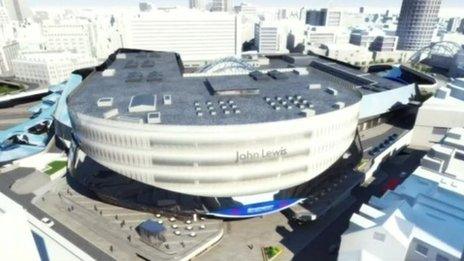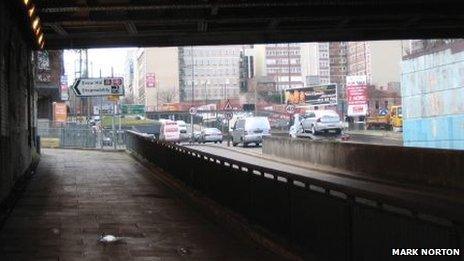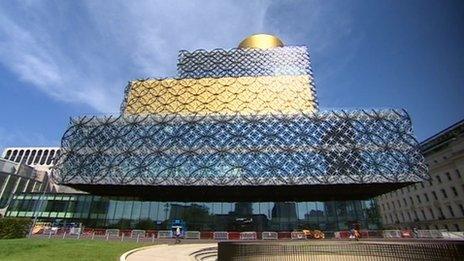Greater Birmingham: Is there a soft rebranding?
- Published
- comments
For once it really is true to say it: the clue is in the name.
Make that "the names". Plural.
Suddenly, it's "Greater Birmingham this", "Greater Birmingham that".
The Greater Birmingham Chambers of Commerce, the Greater Birmingham Professional Services Academy and, most significantly of all, the Greater Birmingham and Solihull Local Enterprise Partnership.

Birmingham's new John Lewis: But is the city still 'hobbled' by preconceptions
GBSLEP's chairman, Andy Street, is also the managing director of John Lewis which will be opening its biggest store outside London next year, adjoining the city's New Street Station redevelopment.
Writing in The Telegraph on Sunday he says: "Our regional economy was hurt at the onset of the recession, but we are emerging more strongly than elsewhere and steadily a new industrial and commercial powerhouse is taking shape."
Recent figures from the Office for National Statistics show unemployment falling faster here than anywhere else outside the South East.
Exports are rising so much faster than in any other region that the West Midlands has a trade surplus with China.
Birmingham Airport's extended runway, due to be completed next month, will open the way for direct services to the Far East, the US West Coast, South America and South Africa.
'Second city, second rate'
Some 16,000 new businesses were created in Birmingham last year, more than in any other city outside London.
So why is the city still hobbled by the reputation that precedes it? It's still better known for what's wrong with it than it is for what's right.
The planning disasters of the 60s and 70s.

The tunnel - and roads leading up to it - in more modern times now have to cope with much more traffic
The "concrete collar" road system remains a laughing stock to this day imposing a tourniquet around the centre which has taken decades longer to demolish than to build.
The dreary architecture which remains more firmly rooted in Britain's psyche than do the growing array of statement buildings. Like them or loathe them, they are certainly not drab.
Most damaging of all, perhaps, is the perception that Birmingham has become a permanently dumbed-down cultural desert with low skills, low aspiration and a mediocre quality of life.
It is undoubtedly true that parts of east Birmingham have some of the UK's highest unemployment rates and the post industrial wastelands and deserted warehouse buildings attest to the succession of well-documented economic shocks over the past 30 years.
But this is also the city whose fast-growing population has a younger age profile than any other in Europe: 40% are under 25. So the four universities within the city limits are not struggling to fill their places.

The Library of Birmingham: "Certainly not drab"
It is also home to a world-famous orchestra and ballet company, a top class producing theatre and the biggest library in Europe.
Only last week I attended one of Birmingham City University's graduation ceremonies after which the former Deputy Prime Minister Lord Heseltine opened their gleaming new Parkside complex, housing the Birmingham Institute of Art and Design and the Birmingham School of Media just a short walk across the new Eastside Park from the site of the proposed high-speed rail station at Curzon Street.
Michael Heseltine has fought a lifelong and largely unavailing battle to reverse the relentless transfer of political power and influence from cities like Birmingham to Westminster and Whitehall.
Most recently he championed in vain the idea of a directly-elected mayor, a sort of Boris for Brum.
Proud history
But it wasn't just the sceptical voters in a thinly-supported referendum who turned their backs on the idea: so too did potential candidates including the former CBI boss Digby Lord Jones of Birmingham.
He told me that a mayoral remit confined to the city limits would make it impossible for the new role to make a real difference: the city's international airport was actually in Solihull; major strategic transport and planning challenges were no respecters of council boundaries.
Now the talk among die-hards, unwilling to let go of what has become known as the 'sub-regional' agenda, is whether the directly-elected Police and Crime Commissioner, who presides over the pan-West Midlands conurbation, could provide a model capable of being morphed into a blueprint for a new style of political accountability right across...wait for it....Greater Birmingham.
Do they really think towns and cities like Dudley, Walsall and Wolverhampton, with long and proud traditions of fierce Black Country independence from Birmingham, are suddenly going to throw in their lot with their bigger neighbour?
'We still make things'
Relations have undoubtedly thawed recently, as we saw last week when the Greater Birmingham and Black Country local enterprise partnerships cooperated so effectively in the "We Still Make Things" campaign. Leading local employers including Jaguar Land Rover joined Birmingham and Black Country MPs and council leaders for a concerted charm offensive at Westminster.
There is of course a very long way from any suggestion of a Greater Birmingham Council subsuming the likes of Sandwell or Solihull.
But one seasoned observer of the local government scene, Paul Dale, reports in The Chamberlain Files blog, external that he detects a distinct stirring in the dovecotes. Because of "the 'Greater Birmingham' success story ..... a soft rebranding exercise has slipped into gear and is being pushed forward by Birmingham City Council and the Greater Birmingham and Solihull Local Enterprise Partnership".
Could this eventually offer at least a partial counter-weight to the rampant growth of the London economy?
Could it perhaps point us towards that holy grail of government policy - rebalancing the economy?
These will be among the questions we'll be addressing in this weekend's Sunday Politics.
I will be joined in the studio by the former Environment Secretary and Conservative Party Chairman, Caroline Spelman, MP for Meriden; and by the Shadow Transport Minister and Labour MP for Birmingham Northfield Richard Burden,
Sunday Politics Midlands starts at 11.00 on BBC One